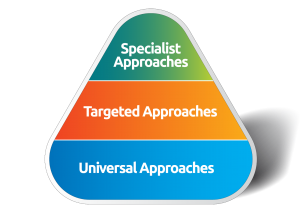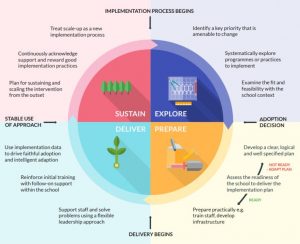Stephen Oswald – CPT3A
When Stephen Oswald moved to the UK he sought ways of expanding his experience in primary and secondary teaching. He found working with young people post 16 was a refreshing challenge.
He is currently a Specialist Assessor and SENCO at a large multicultural sixth form college in south-east London and Kent, and has recently completed the Certificate in Psychometric Testing, Assessment, and Access Arrangements.
What made you choose Real Training over other options?
When the college where I worked was taken over by a large collegiate early in 2013, more specialist assessors were needed as soon as possible. My senior colleague recommended Real Training for their efficiency, adding that I could qualify within a year.
What was your experience of learning with Real Training?
My colleague’s advice was sound. As soon as funds were available, I applied for CPT3A and finished this course ahead of schedule. Not long after qualifying, JCQ stipulated that the assessor’s qualification must be at level 7 and should reflect 100 hours of practical input. It was really helpful when Real Training re-issued my certificate in 2015 – with a supporting letter- to confirm that these requirements indeed have been met.
Throughout all courses with Real Training, I really benefited from the prompt formative feedback on submitted work. The online programmes are easy to navigate, and progress can be self-monitored instantly. It is impossible to miss a component, which actually did happen when I followed another course with a different provider – luckily, they gave me an extension…
How has the course helped make an impact at school?
My CPT3A course has helped me to appreciate that a substantial number of young people in every cohort need an extra depth of understanding and guidance. For that reason, I continued studying ASD and Dyslexia at the Post-Graduate Diploma level. This extension has helped greatly in finding ways of making ILPs and EHCPs work as secondary school pupils transfer through to sixth form. Annually, I take care of around 45 EHCP reviews across sites.
How has the course helped develop you as an educational professional and what do you hope to achieve with the new knowledge/skills in the future?
Real Training has better equipped me for my role as a Specialist Assessor and SENCO. Per year I have meetings and administer assessments with over 300 students across sites. It is very rewarding playing a small part in the students’ progress and assisting them in overcoming obstacles – always realising that ultimately it is their endeavour that sees them through in triumph.
Real Training has also prepared me to lead insets and training – for new teaching staff in particular. About meeting the needs of students with disabilities, learning difficulties and EAL. I have also been able to specialise in writing and illustrating training material for in-house use, aiming for the greatest clarity possible, through brevity, logic and humour.
At present, most work in Additional Learning Support is done via video-link. This has for me only been possible thanks to a solid basis of practice-based training and application of skills in real-life pre-Covid, and I look forward to a safe opening up of society and seeing our students back again.
The implementation of evidence-based SEMH interventions by teaching assistants
In a recent webinar for the Federation of British Schools in Asia (FOBISIA), Real Training Educational Psychologist Dr. Hannah Fairall discussed the implementation of evidence-based Social, Emotional & Mental Health (SEMH) interventions by Teaching Assistants (TAs). The topics covered included how the rise of teaching assistants can be leveraged to deliver crucial support to pupils with SEMH needs, how universal targeted and specialist evidence-based approaches can be used to deliver targeted interventions in the classroom on a 1:1 or small group basis, and the importance of effective implementation.
With the current pandemic, SEMH needs amongst school-aged children have become a central concern, addressing issues such as anxiety, depression, isolation, and grief management. Even prior to this, 1 in 10 pupils aged 5-16 suffer from a clinically significant mental health illness, and 1 in 7 have less severe problems that nonetheless interfere with their development and learning.
The rise of Teaching Assistants, and how to maximise their impact
The rise of Teaching Assistants in classrooms has been meteoric since 2000, with 35% of staff in primary schools and 15% of staff in secondary schools being TAs in 2015. This rise, coupled with the governmental efforts to raise educational standards and reduce teacher workloads, leads naturally to the question of how to effectively leverage this workforce, particularly in the field of SEN. Blatchford et al (2015) found lower levels of progress amongst pupils receiving most support from TAs. The proposed explanation was that TA resource was not being effectively utilised, possibly because TAs were used as an alternative to ‘teacher time’, and that those with greatest need were often taught by the least qualified to do so.
Interventions for supporting SEMH and the three-tiered structure
According to Carroll & Hurry (2018), there are three ‘tiers’ of approach when it comes to SEMH support within schools:

- Universal – whole-school initiatives which foster an environment of emotional wellbeing; for all students
- Targeted – small group or one-to-one support inside or outside of the classroom; for some students
- Specialist – intensive one-to-one which can involve contact with professionals from different agencies; for few students
Universal Interventions
Universal initiatives are those such as the PACE model, developed by Dr Daniel Hughes. This aims to enable staff to engage with children who have experienced neglect, abuse and trauma. Although there is little research of its use in isolation, there is considerable practice-based evidence from parents, staff and professionals of its use as part of a wider intervention.
The PACE model contains four elements:

Another possible universal-level intervention is mindfulness. The aim of this is to learn to be aware of thoughts and bodily sensations in order to be able to better cope with daily emotions and challenges. This has shown promising impacts on wellbeing, aspects of cognition, physical health, and academic grades.
Targeted Interventions
Targeted, one-on-one or small group interventions, delivered by TAs, have the potential to deliver tangible positive effects on the mental health of children in the classroom.
Six evidence-based interventions are discussed:
Emotional Literacy Support Assistant Training (ELSA)
This training enables TAs to deliver 1:1 or small group interventions in several areas of need, including managing emotions, social skills, and bereavement. This covers all age groups.
The Homunculi Approach
This flexible cognitive behavioural therapy is a 10-week programme and seeks to identify emotions and social situations to build social and emotional resilience. This can be especially appropriate for children who have high-functioning ASD.
LEGO-based Therapy
There, children work collaboratively to create models. This approach works well with ASD or other social communication difficulties at primary and secondary levels.
Nurture Groups
Supported by two members of staff, groups of between 6 and 12 spend part of the school day in a nurture group setting. This has been seen to have a positive impact on emotional, behaviour, and learning.
Circle of friends
A support network developed around individuals in the school community that helps with social skills and friendships. There is evidence this approach has positive benefits, which are likely impacted by teacher attitudes, classroom climate and school ethos.
CBT Programme approaches
Books such as ‘Starving the Anger’, ‘Gremlin’ and ‘Think Good Feel Good’ are widely available, and help children to understand emotions and physical responses. The efficacy of CBT is supported by a strong evidence base.
The importance of implementation
Dr Fairall points out that understanding the implementation of these approaches is key. Implementation is the process by which an intervention is put into practice, and concerns what an intervention consists of when delivered and thus the enactment by school staff. This highlights the importance of proper training for educational staff involved in this implementation. Implementation is linked strongly to the intervention’s outcomes, thus the chances of success.

The process is four-fold. It begins with identifying the priority and exploring the available practices to best address this within the school setting. After this adoption decision, a clear, logical plan is outlined and the readiness of the school to deliver is considered and staff and infrastructure prepared. Once delivery has begun, implementation data is used to drive adoption and adaptation, reinforcing initial training with follow-on support to solve problems that might arise. Finally, the stable use of the intervention is established, scaling up begins, and good implementation practices are rewarded.
Finding the optimal conditions through which to deliver effective implementation is key. School staff must be aware and committed to the intervention. Those delivering the intervention must be properly supported through the process. Additionally, the wider ethos and climate of the setting must be conducive to the intervention being implemented effectively.
Furthermore, research from Humphrey (2013) suggests three elements that influence outcomes of SEMH interventions:
- Participant reach is crucial for equality of access to interventions. Educational settings should consider how students are referred, and that the correct interventions are available to all those who could benefit from them.
- Fidelity is the extent to which critical components of a programme are present. This may manifest itself in such ways as schools adapting interventions to suit their setting, which can lead to positive outcomes for students.
- The number of sessions, much like a medicinal dosage, should be sufficient to encourage the intended positive outcomes. Those schools that deliver the required number of sessions achieve better outcomes than those who do not.
Implementation of Emotional Literacy Support Assistant Training (ELSA) (Fairall, 2020)
Finally, Dr. Fairall presented her own doctoral project on the implementation of the ELSA programme. It was found that schools can implement the programme in different ways, and there was a range of factors at different stages of implementation which supported effective implementation.
An implementation resource has been created for schools, which draws on the findings of the present research in conjunction with implementation literature. This resource is aimed at Senior Leadership/SENCOs, and may also be discussed in conjunction with the ELSA. The resource aims to provide guidance and support specific to the stage of implementation the school are in. This resource can be adapted in light of further research into this area.
Conclusion
In summary, with the correct training, implementation, and support in the teaching space, TAs can be more than capable of delivering evidence-based SEMH-related interventions that have tangible positive effects on the pupils who take part. In line with the Educational Endowment Foundation guidance, TAs can be effectively used to deliver 1:1 targeted interventions, and are a largely untapped educational resource that can be better utilised for the betterment of the educational setting at large. It is possible to support student’s SEMH needs through the tiered approach, and TAs are a key part of the successful delivery of these interventions. In order to achieve the best results, it is important to school staff understand and are fully behind the interventions, and understand the practice behind effective implementation.
Find out more
You can find out more about this topic through our Social, Emotional and Mental Health Needs SEND Programme module. Alternatively, our sister company Dyslexia Action has a short level 5 CPD course The Emotionally Connected Classroom. Please don’t hesitate to contact us at info@realgroup.co.uk or on +44 (0)1273 35 80 80 if you have any questions.
UK Children’s Mental Health Week & Leading Inclusivity
This week is UK Children’s Mental Health Week. Set up by children’s mental health charity Place2Be, it aims to bring to national attention the importance of children and young people’s mental health. For 2021, the theme is ‘Express Yourself’’ and is all about finding ways to share feelings, thoughts, or ideas, through creativity. This could be through art, music, writing and poetry, dance and drama, photography and film, and doing activities that make you feel good. At a time of extreme mental and emotional stress for everybody, this can be an incredibly effective way to communicate difficult thoughts and feelings.
Understanding Social, Emotional and Mental Health Needs within your educational setting
According to Place2Be, around one in three children in every primary school class has a mental health difficulty, and many others struggle with challenges including bullying and bereavement. In particular now in these unprecedented times, many will be dealing with issues they may not have faced before, such as isolation and loneliness, anxiety and depression. Having the theoretical understanding and practical skills to make a positive difference to young people with mental health challenges has become more vital than ever. Fortunately, these topics and more are covered in our module; Social, Emotional and Mental Health Needs (SEMH). This 30 masters-level credits module is available as part of our Masters in Leading Inclusive Education (MALIE) Programme, and our Master of Education in Special Educational Needs & Disabilities (MEd SEND) programme.
SEMH & MALIE
MALIE is an exciting, distance-learning pathway for education professionals from all phases and settings, who wish to progress into leadership roles or to develop their leadership skills, in the crucial area of inclusion. Developing inclusive education practice to support the needs of all learners is one of the most important challenges facing education professionals today. After completing your mandatory Leadership of Inclusive Practice module, you are free to choose two from six 30 masters-credit modules, of which Social, Emotional and Mental Health Needs (SEMH) is one. The MALIE Programme aims to develop your skills and confidence to enable you to lead inclusive practice in your setting, allowing you to create a safe, supportive learning environment for students with special mental health needs.
Our next MALIE cohort begins on 15 February, and we recommend registering as soon as possible to allow time to process your application and payment.
SEMH & MEd SEND
Social, Emotional and Mental Health Needs (SEMH) is also available as a skills & knowledge module in our SEND programme, recently shortlisted for the BETT 2021 Award in the Special Educational Needs Solutions Category. This module has been designed to develop your understanding of social, emotional and mental health needs, understand the skills that you need to use to make a positive difference to your setting, and develop the essential knowledge of the latest policies, theories and research. Completion of this module along with the Evidence and Pedagogy for Inclusion module leads to the Postgraduate Certificate in SEND: Social, Emotional and Mental Health Needs (60 credits), or you can take the 30 masters-level credits to work towards a the Postgraduate Diploma (120 credits) or MEd SEND (180 credits).
Our next SEND Programme cohort starts on 15 May, but you can book today.
SEMH CPD Unit with Real Group’s Dyslexia Action – The Emotionally Connected Classroom
The Emotionally Connected Classroom is a Level 5 unit provides an understanding of the impact of emotions on the thinking brain and its implications for learning. It aims to provide an introduction to key elements of current research and practice in mentalisation theory (understanding the mental state of oneself and others) and emotional coaching. The importance of connectedness and relationships is emphasised throughout.
This unit is suitable for TAs or those without a degree, as well as educational professionals looking for a shorter course. Like the MEd and MALIE modules above, this unit is delivered through our online learning platform Campus Online.
Our next cohort starts on 17 March. For more information on this course or to book your place, please click here.
If you have any further questions or queries about any of these courses or qualifications, please don’t hesitate to get in touch on +44 (0)1273 35 80 80 or info@realgroup.co.uk and we will be happy to help.

